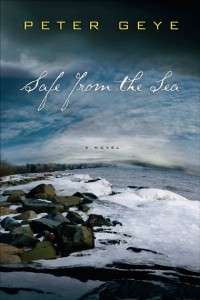Safe from the Sea
Peter Geye
Unbridled Books First Edition:May 21, 2009
ISBN 978-1-60953-008-2
Duluth, Minnesota, located on Lake Superior’s North Shore, is the nation’s final inland harbor even though it is staunchly situated in the upper Midwest, accessible to ocean-going vessels via the Great Lakes Waterway and the Saint Lawrence Seaway. To stand by the Aerial Lift Bridge as a huge freighter ghosts through the channel, to watch the ship glide through dark water while crewmen busy themselves on deck, to hear its sounding horn, to search for the flag that declares its nationality, to wonder what it holds, is an almost out of body experience. The Great Lakes are legendary in their severity; the men and women who ply the great ships that transverse them are a breed apart. Many people only know of shipping on the Great Lakes through the Gordon Lightfoot ballad, “The Wreck of the Edmund Fitzgerald“, lamenting the sinking of the massive freighter in a sudden November storm. All 29 crew members were lost; why she sank remains a mystery – the ship and the bodies of her crew have never been found. (“Does anyone know where the love of God goes/When the waves turn the minutes to hours?“) In Safe from the Sea, Minnesota native Peter Geye weaves a compelling story of an ailing father, a prodigal son and the pall of another maritime shipwreck casting shadows across their relationship, in the setting of a remote cabin in the North Woods at the edge of Lake Superior. It’s a moving and sometimes searing character study of two men caught up in their own pain and betrayals. Noah Torr lives in Boston where he owns an antique map shop. He and his wife have unsuccessfully been trying to conceive a child; so far all the pregnancies have not come to term and their marriage is starting to bow under the strain. When Noah gets the call from his father, who still lives just outside of remote Misquah, Minnesota, north of Duluth, he knows something bad has happened. He hasn’t seen his father in eight years, since his East Coast wedding when the two parted acrimoniously. Now his father is calling, asking for help to get his place ready for winter. When Noah asks why, his father simply says “I’m sick, Noah.” Olaf Torr never asks for help, he’s always insisted on stubbornly doing all things alone, ever since he retired from working on the big ships that ran the Lakes. Olaf Torr is indeed a stubborn man, a hard drinker, an absentee father as he spent weeks at a time on the water. But he is also a broken man, a man haunted by closely guarded memories. For Olaf was an officer on the SS Ragnarøk, that jewel of the Superior Steel Company fleet, when it foundered and sank on Lake Superior in November 1967. Out of a crew of 30 men, only three survived; Olaf Torr was one of those three. Although he made it to shore and ended up spending many more years on other freighters, he was never the same man as he was before that stormy November night. His marriage fell apart and then his wife died, his family left him, and he fell into the stoic isolation and resiliency of his Norwegian forefathers, living alone with his thoughts and his memories. Now he is sick. A resentful but dutiful Noah flies back to Minnesota, returns to his boyhood home, and takes up there where his life had left off, helping his father cut wood for the fireplace, clear fallen pines, fix up the house. They fish, they walk, they make food. Slowly, the truth comes out. Olaf is in pain. He is dying. He needs to put his house in order. And he needs to share with his son – the son who walked away – the stories with which he has suffered alone for so many years. He needs to pass on what happened on the Ragnarøk, the story that never truly was told, which is at the heart of their family legacy.
“You end up as the line in a poem, as the face in a picture in a museum. Meanwhile, your crewmates are dead and you haven’t talked to your wife – honestly talked to her – in years. And your kids grow to fear you. And instead of making it right you let it ride. You drink in the raunchiest bars in eight states. Jesus do you drink.” He cleared his voice now and said more loudly than he had said anything in an hour, “And you lose all shame.” In his faintest voice yet he concluded, “Chrissakes, that is some ancient grief.”
Safe from the Sea is a slow moving, gorgeous, contemplative yet gripping book about being a son to a difficult father, about never truly being able to leave your past behind you, and about reconciling where you came from with where you end up being. Author Geye has an incredible ear for the rhythm of the North Shore and the cadence of maritime life, as well as a generous eye for life as it simply is, for that which best unfolds on its own, without urgency, for time spent taking in that surrounds us without judgment or justification. He manages to spin a poignant tale without tugging at heartstrings, and the story is all the better for it. Olaf Torr would brook no tears, anyway, he has no use for them. In this fast moving, over saturated, sensationalized world that we live in, it’s rewarding to sit and read a quiet book, one that runs deep – just like the Great Lakes that drives it.

